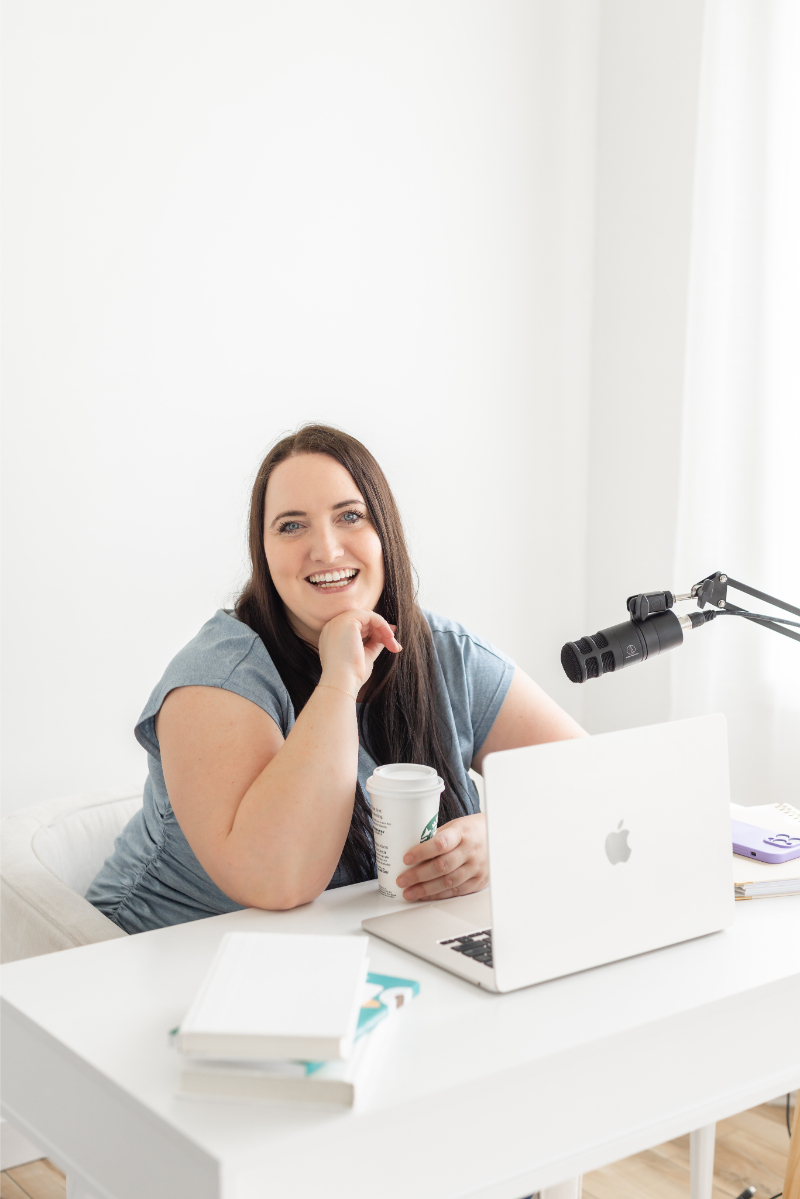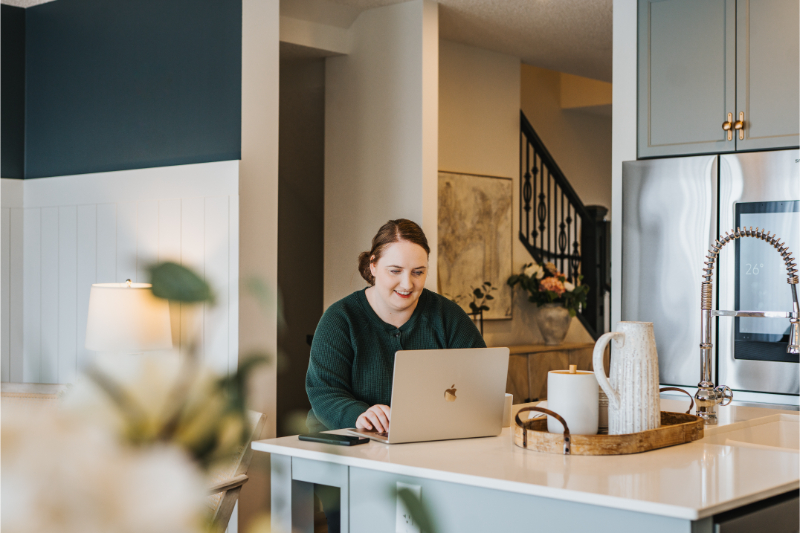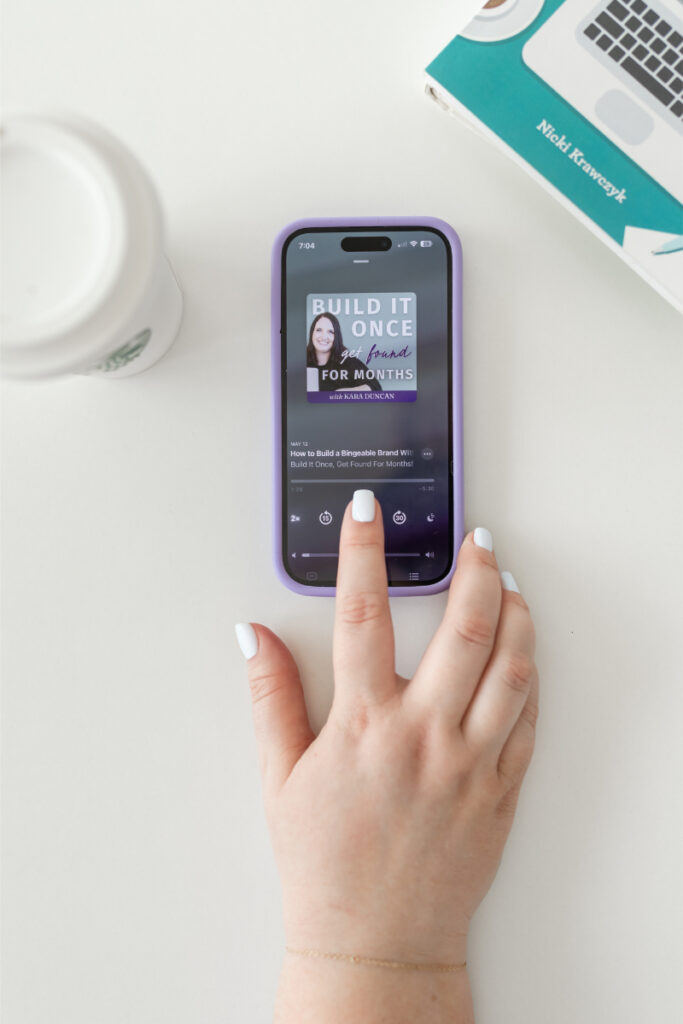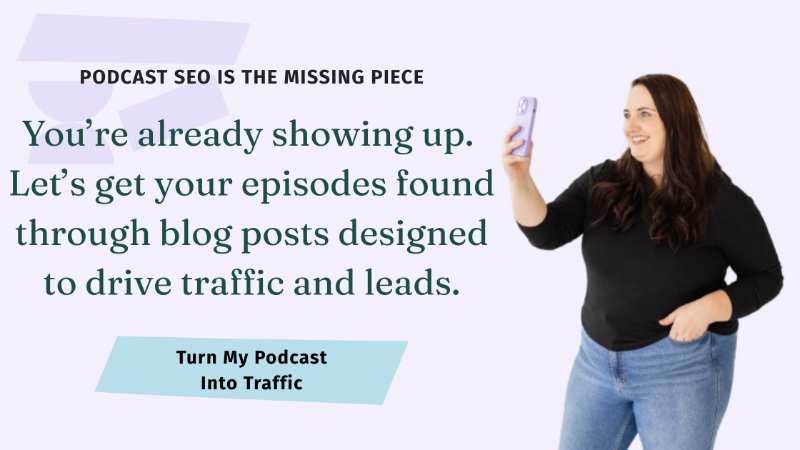Your podcast is packed with value from thoughtful conversations, expert advice, and content that could genuinely help someone. But if it feels like no one’s finding it unless you personally send the link or talk about it on Instagram… you’re not imagining things. Apple and Spotify just aren’t built for discoverability. And without podcast SEO in place, your episodes are basically invisible to anyone who’s not already subscribed.
I’m Kara—a podcast-obsessed blog and Pinterest strategist who helps women entrepreneurs turn their content into long-lasting visibility tools. If you’re ready to turn your podcast into a growth engine (without burning out), you’re in the right place.
In this post, I’ll walk you through how to align your podcast with searchable, high-intent keywords, structure your episode titles and descriptions to attract the right listeners, and optimize your episode pages and blogs for search traffic. Plus, I’ll show you how to use transcripts and pull quotes for Pinterest and embed CTAs that convert.
Let’s turn your podcast into the discovery tool it was always meant to be by using podcast SEO effectively!

Align Your Podcast Content with Searchable, High-Intent Keywords
If you want new listeners to find your podcast, you need to start thinking like a search engine. Podcast SEO starts with choosing the right keywords, ones that your ideal listener is already typing into the search bar.
Instead of naming your episode something vague like “My Morning Routine,” use a phrase your audience is actively searching for, like “Morning Routine for Creative Entrepreneurs” or “Productive Morning Routine for Business Owners.” These long-tail keywords help signal what your episode is about and match real search intent.
Here’s how to get started with podcast SEO:
- Use tools like Pinterest Trends, AnswerThePublic, or Google autocomplete to see what people are searching. If you want a deeper dive into keyword research tools and strategies, check out this post!
- Think like your listener. What problem is your episode solving? What exact phrases would they Google to find it?
- Use your keyword in multiple places: the episode title, description, blog post recap, and Pinterest pins.
This doesn’t mean stuffing your content with keywords, it means weaving them in naturally so both Google and your audience understand the value of your episode.
The more specific your title, the more likely it is to show up in search results and attract someone who’s actually excited to listen. Because when people feel like an episode was made for them, they press play.

Structure Episode Titles and Descriptions to Attract Your Ideal Listener
Your podcast title might be clever, but is it clear? When it comes to podcast SEO, clarity beats creativity every time, especially in your episode titles and descriptions.
Think of your title as a headline. It needs to instantly tell someone what they’ll get out of pressing play. Swap vague titles like “Let’s Talk About Growth” for specific ones like “3 Ways to Grow Your Email List Without Social Media.” That second option? It not only uses keywords but speaks directly to your ideal listener’s goals.
A few tips to make your titles work harder:
- Lead with keywords, not the episode number.
- Include numbers or outcome-based phrases (e.g., “How to…” or “X Steps to…”).
- Use language your audience would actually search, not just industry terms.
And don’t forget the episode description! This is where you can expand on the topic, include keywords naturally, and add links or calls to action. The first few lines often show up in search results, so front-load them with value.
If you’re writing blog recaps or show notes too, make sure your title and description align across all platforms. Consistency helps build trust and signals to Google that your content is worth ranking. Not sure how to write show notes that actually help you grow? Read this post for strategies that turn your podcast into a visibility engine.
The goal is simple: help your dream listener find you, click play, and keep coming back for more.
SEO Optimizing Your Episode Pages and Blog Recaps for Traffic
Publishing an episode is just the first step, what you do after that determines how many people actually find it. Both your episode page (the one your podcast player links to) and your blog recap should be optimized to bring in consistent, long-term traffic through search.
Here’s how to make sure both are pulling their weight:
1. Use a keyword-driven title that mirrors your blog recap.
Whether it’s a podcast player page or a blog post, your title should reflect the keywords your audience is searching for. Think: “How to Start a Creative Business” instead of just “Episode 72.”
2. Write a clear, compelling meta description.
This shows up in search results, so make it count. Keep it under 160 characters and include your keyword naturally.
3. Include a short but strategic intro at the top.
Explain what the episode covers, who you are, and who the episode is for. A clear hook helps your ideal listener know they’re in the right place, and it gives Google more context.
4. Add a blog recap with digestible takeaways.
Instead of just embedding the audio, write a thoughtful blog-style summary. Use headers, bullets, and keywords to make it easy to scan (and rank).
5. Link generously—both internally and externally.
Point to past episodes, blog posts, or relevant services. And if you reference guests or tools, link to those too.
When your episode pages and blog posts are working together, you’re not just creating content. You’re building a podcast SEO foundation that grows with every episode.

Using Episode Transcriptions and Quotes for Pinterest and Blogs
Your episode transcripts are a goldmine, don’t let them collect dust! With a few smart tweaks, they can fuel your content across Pinterest, your blog, and beyond.
- Highlight standout quotes – Pull juicy soundbites, stats, or spicy takes from your transcript. These make eye-catching Pinterest pins, blog pull-quotes, or social captions that link back to your episode.
- Use transcripts as a blog outline – Instead of starting your blog recap from scratch, use your transcript to guide the structure. Identify main talking points, then shape them into a reader-friendly post with SEO-rich headers.
- Design Pinterest graphics from your audio – Create pins using standout lines or one-liners from your episode. Pair them with brand visuals and link directly to the episode page or blog recap. (Don’t forget to include your keyword in the pin description!)
- Maximize reach without starting over – By pulling from what you’ve already recorded, you’ll reach people who prefer to read, search, or scroll, without creating brand-new content.
If you want more behind-the-scenes strategies for repurposing your podcast content and turning episodes into evergreen marketing tools, I spill it all inside my private podcast. It’s free and made for podcasters like you.
Embedding Calls-to-Action and Links to Offers in Every Episode/Show Note
If someone listens all the way through your episode, or finds you through a blog or Pinterest pin, you don’t want to leave them hanging. Every episode is a chance to guide your audience toward the next step in their journey with you.
That might be downloading a freebie, joining your email list, or checking out a paid offer. The key is to include intentional CTAs, so your listener or reader knows exactly what to do next.
Place your main call-to-action in these spots:
- In the audio itself (near the beginning and the end of the episode)
- In your show notes on podcast platforms
- In your blog recap and Pinterest descriptions
Make sure the CTA aligns with the episode topic. If you’re talking about visibility strategies, link to your SEO guide. If it’s an episode on boundaries, invite them to your boundaries workshop.
This consistency builds trust, increases conversions, and turns passive listeners into leads.
Final Thoughts
You’re already pouring your best ideas and energy into your podcast. But if your episodes aren’t getting found, or turning listeners into leads, it’s time for a smarter system. One that doesn’t rely solely on Apple or Spotify to do the heavy lifting.
Podcast SEO doesn’t have to feel overwhelming. With intentional episode titles, keyword-rich content, and strategic blog recaps, your podcast can bring in search traffic and sales long after you hit publish.
And if this sounds like a lot to manage on your own? Let me do it for you!
My team and I write done-for-you blog posts for your podcast episodes that help you get found on Google, repurposed on Pinterest, and discovered by people who are already searching for what you talk about.
If you’re ready to turn your podcast into a lead-generating machine, I’d love to help you make it happen. Reach out here to get started! And if you want even more tips on getting more listeners with podcast SEO, come hang out on Instagram and Pinterest.
